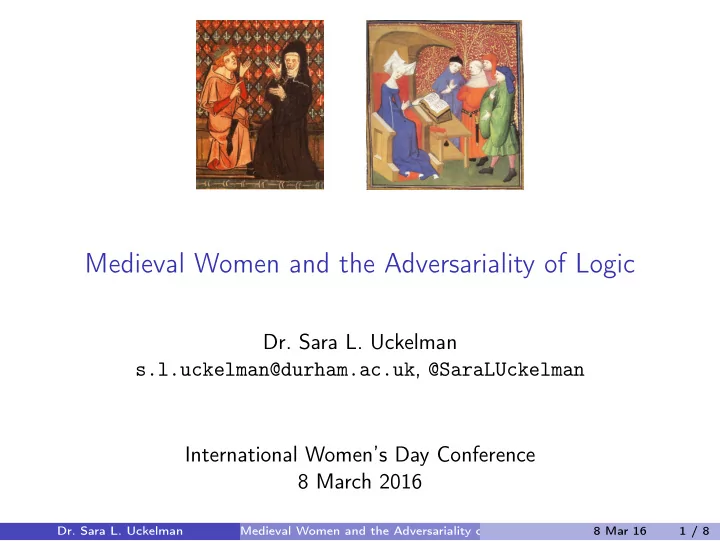

Medieval Women and the Adversariality of Logic Dr. Sara L. Uckelman s.l.uckelman@durham.ac.uk , @SaraLUckelman International Women’s Day Conference 8 March 2016 Dr. Sara L. Uckelman Medieval Women and the Adversariality of Logic 8 Mar 16 1 / 8
A bit of background This talk has grown out of reflection on two recent developments in the study of logic: Dr. Sara L. Uckelman Medieval Women and the Adversariality of Logic 8 Mar 16 2 / 8
A bit of background This talk has grown out of reflection on two recent developments in the study of logic: A growing interested in medieval logic. Dr. Sara L. Uckelman Medieval Women and the Adversariality of Logic 8 Mar 16 2 / 8
A bit of background This talk has grown out of reflection on two recent developments in the study of logic: A growing interested in medieval logic. A growing recognition of the gender-imbalance in logic/math/philosophy. Dr. Sara L. Uckelman Medieval Women and the Adversariality of Logic 8 Mar 16 2 / 8
A bit of background This talk has grown out of reflection on two recent developments in the study of logic: A growing interested in medieval logic. A growing recognition of the gender-imbalance in logic/math/philosophy. A natural combination of these two issues results in an on-going research project of mine: Where are the women in medieval logic? Dr. Sara L. Uckelman Medieval Women and the Adversariality of Logic 8 Mar 16 2 / 8
Two different questions Dr. Sara L. Uckelman Medieval Women and the Adversariality of Logic 8 Mar 16 3 / 8
Two different questions What is logic? Dr. Sara L. Uckelman Medieval Women and the Adversariality of Logic 8 Mar 16 3 / 8
Two different questions What is logic? What is a logician? Dr. Sara L. Uckelman Medieval Women and the Adversariality of Logic 8 Mar 16 3 / 8
What is logic? Dialectic Philosophy of language: signification, meaning. Argumentation and the practice of debate. Dr. Sara L. Uckelman Medieval Women and the Adversariality of Logic 8 Mar 16 4 / 8
What is a logician? 1 One who writes treatises on logic? 2 One who practices or uses logic? Dr. Sara L. Uckelman Medieval Women and the Adversariality of Logic 8 Mar 16 5 / 8
Argumentation: Adversariality and techniques of silencing Strong connection between production of textbooks/theoretical treatises and university activity. Dr. Sara L. Uckelman Medieval Women and the Adversariality of Logic 8 Mar 16 6 / 8
Argumentation: Adversariality and techniques of silencing Strong connection between production of textbooks/theoretical treatises and university activity. Male/female antagonism: Two case studies. ◮ The adversariality of argumentation: Eloise rejects what Townsend calls the “tradition of dialectical disputation and the social customs of ritualized male aggression”. ◮ Self-silencing & removal from discourse: “Je ne suis logicienne”, Christine de Pizan writes in the Epistres sur le ‘Roman de la Rose’ . Dr. Sara L. Uckelman Medieval Women and the Adversariality of Logic 8 Mar 16 6 / 8
Eloise d’Argenteuil & The adversariality of argumentation c. 1090?/1100?–1164. Student and lover of Abelard. Recognized as an important ethical philosopher in her own right in modern times. After Abelard’s death, Peter of Cluny complimented her on the fact that she had “left logic for the gospel, Plato for Christ, the Academy for the cloister”. Dr. Sara L. Uckelman Medieval Women and the Adversariality of Logic 8 Mar 16 7 / 8
Christine de Pizan & Silencing by removing oneself from the dispute Born in Venice, 1364; grew up in the French court of Charles V as her father was the king’s astrologer, alchemist, and physician. Began writing after being widowed at 25. Best known for her French courtly poetry, but also wrote books on practical advice for women. The Book of the City of Ladies : Dialogue between allegorical women representing Reason, Justice, and Rectitude, written in a highly skilled dialectical style. Dr. Sara L. Uckelman Medieval Women and the Adversariality of Logic 8 Mar 16 8 / 8
NOTES: On p. 53, Laennec says: âĂİShe writes in a letter to Pierre Col, âĂİje ne suis logicienneâĂİ (p. 117) (âĂİI am not a logicianâĂİ), but in the following paragraph proceeds to challenge his argument by setting him a classical problem of logic to solve: âĂİSe tu dis oyl, câĂŹest faulx. . . .Se tu me dis non, doncques te dis je vraye ma proposicionâĂİ (pp. 117-18) (âĂİIf you say yes, itâĂŹs false. ... If you tell me no, then you have proved true my propositionâĂİ).âĂİ Here is the context of the part âĂİSe tu me dis non, doncques te dis je vraye ma propositionâĂİ (EROS.244a:05 and around): http://www.pizan.lib.ed.ac. uk/xmlfinal/eros.xml. The part where Christine de Pizan argues that she is not a logician is a bit earlier, at line EROS.243d:04 of the same text, âĂİLes Epistres sur le Rommant de la RoseâĂİ. Have fun! Dr. Sara L. Uckelman Medieval Women and the Adversariality of Logic 8 Mar 16 8 / 8
Recommend
More recommend